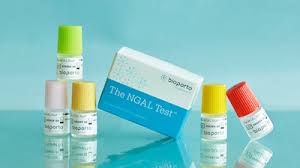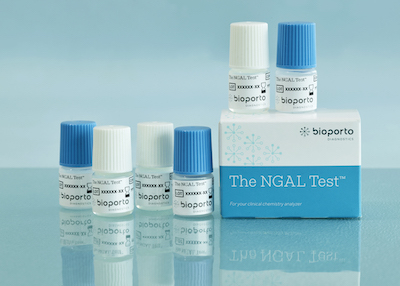
What is NGAL?
NGAL is a novel biomarker for diagnosing acute kidney injury (AKI). The key advantage of NGAL is that it responds earlier than other renal status markers like serum creatinine and shows a proportionate response to injury. NGAL therefore provides a new way to identify patients at risk of developing potentially severe acute kidney injury (AKI) - 24-72 hours before the problem would otherwise be detected.

Detected 2-3 days before creatinine rises
Until now, assessing risk of AKI in critically ill patients has relied on changes in serum creatinine and urine output, physiologic endpoints that are delayed, non-specific, and impacted by extrarenal factors such as nutritional status and muscle mass.
The NGAL biomarker rises rapidly in response to kidney injury, preceding changes in creatinine by as much as 2 to 3 days.
By identifying patients at risk of AKI early, clinicians can take more appropriate action to manage fluid levels, avoid nephrotoxic agents, and potentially prevent permanent kidney damage.
NGAL Characteristics
FAST
NGAL responds just 2 hours after kidney injuryii and 2-3 days before serum creatinine rises.
ADDITIVE
NGAL+ identifies subclinical AKI when serum creatinine alone failed to identify 43% of AKI.
PROGNOSTIC
Identifies patients at risk of developing moderate to severe AKI
RESULTS
Improved management of AKI can reduce LOS, minimize unnecessary interventions, and inform treatment choices.
CLINICALLY RELEVANT
The NGAL biomarker has been studied in over 16,500 patients in numerous settings including post-cardiac surgery, in critical illness, and post kidney transplantation. In each setting, "NGAL significantly improved the prediction of AKI risk over the clinical model alone."
BioPorto Diagnostics is a company that makes labs tests to help doctors detect medical conditions. One of their products, the NGAL test, looks at the blood to find biomarkers (an indicator of some biological state or condition) which can predict if patients are developing acute kidney injury (AKI.) AKI happens when your kidneys unexpectedly and abruptly have problems functioning due to a variety of factors. The purpose of this study is to show if the NGAL test can be used as a predictor for acute kidney injury in patients who have been admitted to the intensive care unit (ICU). The NGAL test is investigational, which means it has not been approved by the US Food and Drug Administration to predict acute kidney injury.